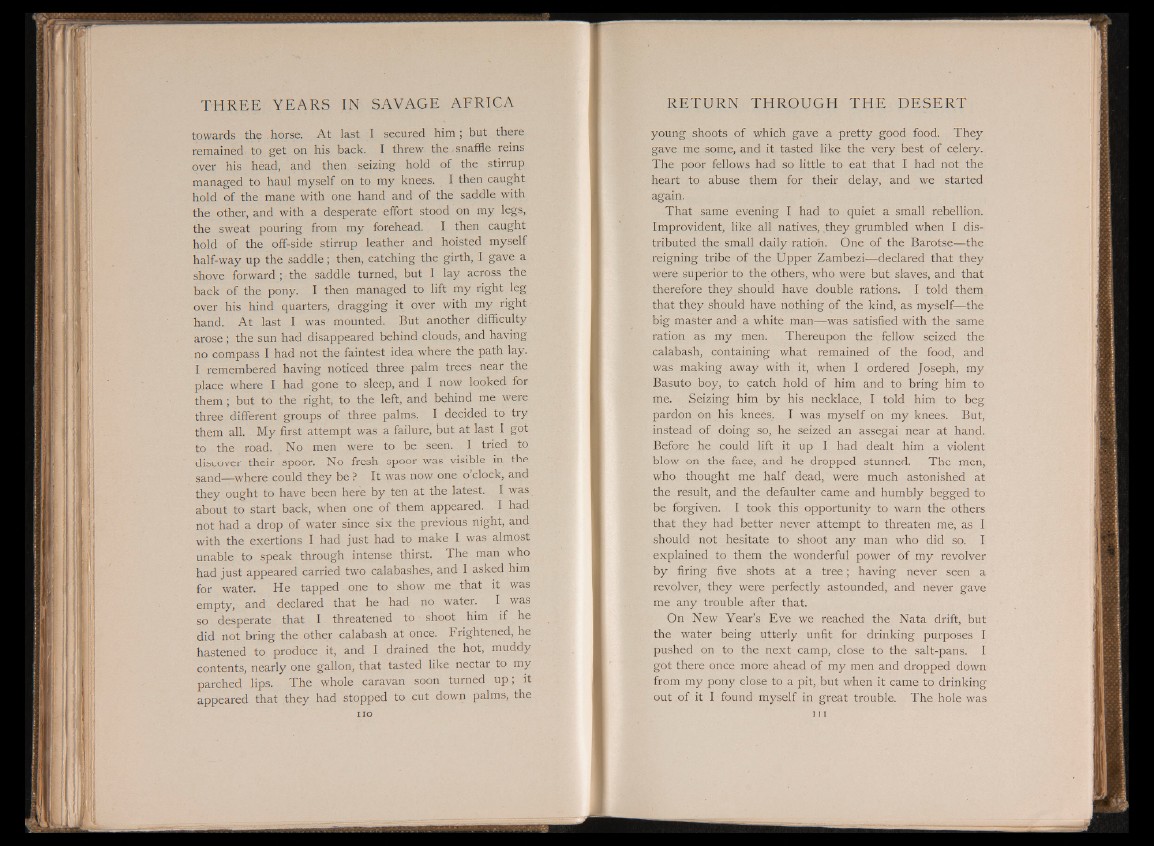
towards the , horse. At last I secured him ; but there
remained to get on his back. I threw the snaffle reins
over his head, and then seizing hold of the stirrup
managed to haul myself on to my knees. I then caught
hold of the mane with one hand and of the saddle with
the other, and with a desperate effort stood on my legs,
the sweat pouring from my forehead. I then caught
hold of the off-side stirrup leather and hoisted myself
half-way up the saddle; then, catching the girth, I gave a
shove forward ; the saddle turned, but I lay across the
back of the pony. I then managed to lift my right leg
over his hind quarters, dragging it over with my right
hand. At last I was mounted. But another difficulty
arose ; the sun had disappeared behind clouds, and having
no compass I had not the faintest idea where the path lay.
I remembered having noticed three palm trees near the
place where I had gone to sleep, and I now looked for
them ; but to the right, to the left, and behind me were
three different groups of three palms. I decided to try
them all. My first attempt was a failure, but at last I got
to the road. No men were to be seen. I tried to
discover their spoor. No fresh spoor was visible in the
sand—where could they be ? It was now one o clock, and
they ought to have been here by ten at the latest. I was
about to start back, when one of them appeared. I had
not had a drop of water since six the previous night, and
with the exertions I had just had to make I was almost
unable to speak through intense thirst. The man who
had just appeared carried two calabashes, and I asked him
for water. He tapped one to show me that it was
empty, and declared that he had no water. I was
so desperate that I threatened to shoot him if he
did not bring the other calabash at once. Frightened, he
hastened to produce it, and I drained the hot, muddy
contents, nearly one gallon, that tasted like nectar to my
parched lips. The whole caravan soon turned up, it
appeared that they had stopped to cut down palms, the
young shoots of which gave a pretty good food. They
gave me some, and it tasted like the very best of celery.
The poor fellows had so little to eat that I had not the
heart to abuse them for their delay, and we started
again.
That same evening I had to quiet a small rebellion.
Improvident, like all natives, they grumbled when I distributed
the small daily ratioh. One of the Barotse—the
reigning tribe of the Upper Zambezi—declared that they
were superior to the others, who were but slaves, and that
therefore they should have double rations. I told them
that they should have nothing of the kind, as myself—the
big master and a white man—was satisfied with the same
ration as my men. Thereupon the fellow seized the
calabash, containing what remained of the food, and
was making away with it, when I ordered Joseph, my
Basuto boy, to catch hold of him and to bring him to
me. Seizing him by his necklace, I told him to beg
pardon on his knees. I was myself on my knees. But,
instead of doing so, he seized an assegai near at hand.
Before he could lift it up I had dealt him a violent
blow on the face, and he dropped stunned. The men,
who thought me half dead, were much astonished at
the result, and the defaulter came and humbly begged to
be forgiven. I took this opportunity to warn the others
that they had better never attempt to threaten me, as I
should not hesitate to shoot any man who did so. I
explained to them the wonderful power of my revolver
by firing five shots at a tree; having never seen a
revolver, they were perfectly astounded, and never gave
me any trouble after that.
On New Year’s Eve we reached the Nata drift, but
the water being utterly unfit for drinking purposes I
pushed on to the next camp, close to the salt-pans. I
got there once more ahead of my men and dropped down
from my pony close to a pit, but when it came to drinking
out of it I found myself in great trouble. The hole was